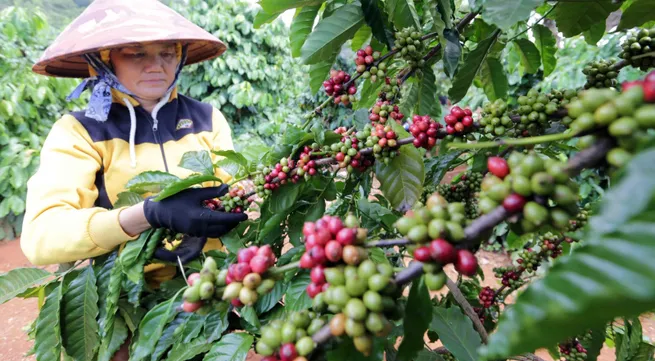Focusing on increasing coffee’s export value

However, the prices of exported coffee still increased. Generally in the first quarter, the average coffee export price reached US$1.801 trillion per tonne, up 6.8% over the same period in 2020.
In the early days of May, the domestic robusta coffee market has seen many flourishes with the sales price remaining in the range off VND32,000 (US$1.40) to VND34,000 (US$1.49) per kilogramme. Specifically, the coffee price in Di Linh, Bao Loc and Lam Ha Districts (in the Central Highland Province of Lam Dong) was VND33,200 (US$1.45) per kilogramme on May 6. Coffee was sold at the price of VND33,900 (US$1.48) per kilogramme in Cu M’gar District in Dak Lak Province and VND33,900 and VND33,800 (US$1.48) in Gia Nghia and Dak R’lap District in Dak Nong Province, respectively.
Over the years, selling prices have continuously plunged, so the signals of price increases in the past few days will serve as great motivation for coffee growers. Explaining the reason for the price increase, many economists say that the coffee market has gone through a cycle of price decline for four consecutive years. Therefore, in many countries, including Vietnam, people have used part of their coffee cultivation area for other crops, leading to a reduction in coffee output. In addition, the COVID-19 outbreak has made the export of robusta coffee in many Asian countries slow down.
It is a fact that coffee growers often suffer from insecurity in terms of sales prices. Low quality and low selling prices have been shortcomings of the coffee industry for many years. The country’s coffee products have been exported to over 80 countries and territories around the world, accounting for 14.2% the global green coffee export market share, ranking second only to Brazil. Vietnam produced over 1.5 million tonnes of coffee on average, but this was mainly green coffee (accounting for around 90%). Therefore, added value was low and profit was not commensurate with the volume of exports. In fact, the prices of green coffee in the domestic market have increased recently mainly thanks to objective reasons, not necessarily a sharp improvement of the coffee’s quality.
In order to increase export value, firstly, it is crucial to improve product quality. The time has come for the coffee sector to make high-quality products right from the beginning. The rebound of coffee prices could act as a "lever" for coffee growers to pay more attention to caring for and re-investing in their crops. On this basis, authorities should develop a stricter standard from production to harvest, towards improving coffee yield and quality. Currently, the farmers’ coffee harvests still have many shortcomings as they mainly use the method of plucking branches. When the coffee is about 40 to 50% ripe, people begin picking both ripe and green fruits, rendering the coffee’s quality uneven. There are also many black beans that are easily broken during preliminary processing, so their value is reduced at sale. This problem needs to be fixed soon. In addition, it is essential to develop specific support mechanisms on capital, science and technology so that people can invest in technology for production as well as implement recultivation.





